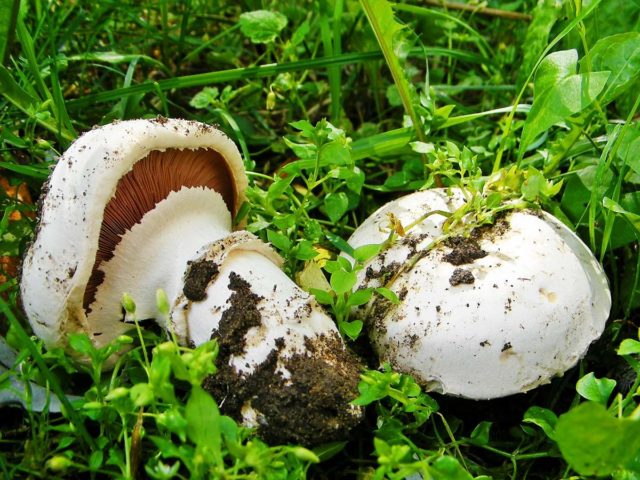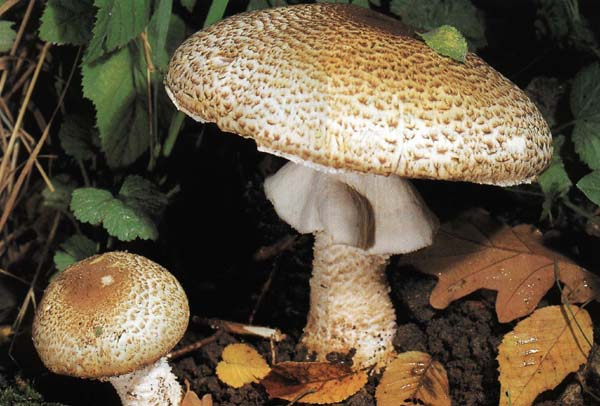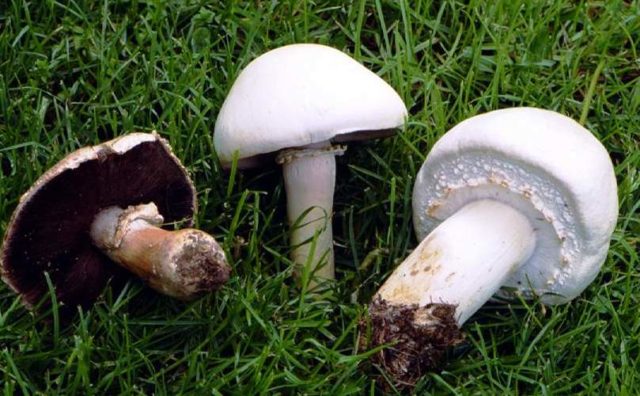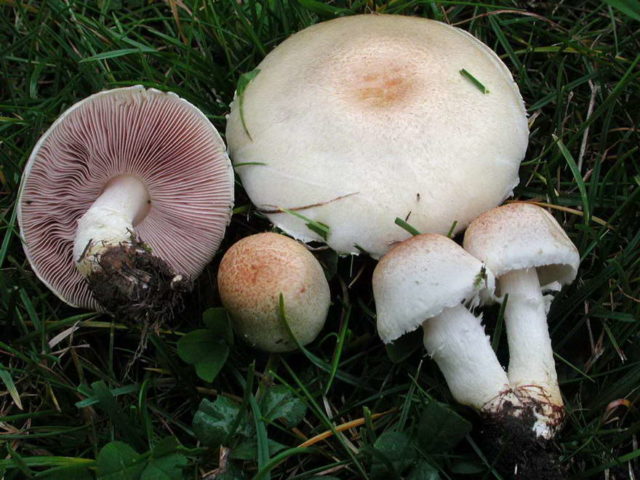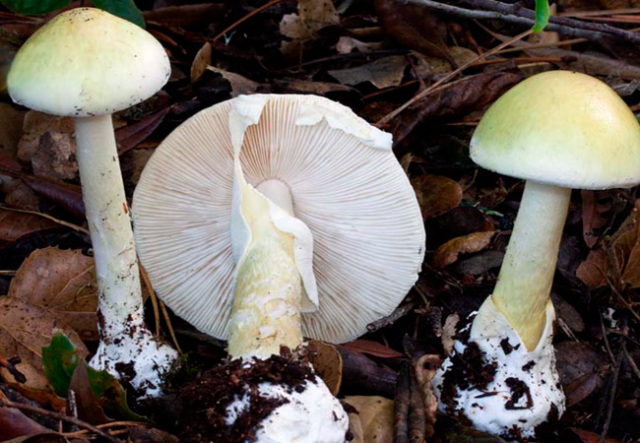Content
Two-ring champignon (lat. Agaricus bitorquis) is an edible mushroom of the Champignon family (Agaricaceae), which, if desired, can be grown on your site. Other names for this species: champignon chetyrehsporovy or sidewalk. The latter reflects one of the places of the greatest distribution of the fungus - within the city, it often grows near roads.
What does a two-ring champignon look like?
The cap of a ripe fruiting body can reach 4-15 cm in diameter. It is painted white, sometimes slightly grayish, as well as the leg. To the touch, the two-ring champignon cap is completely smooth, although sometimes you can feel barely noticeable scales in the very center.
At the first stage of development, the cap is egg-shaped, but then it takes on a half-open appearance. In mature mushrooms, it resembles a hemisphere flattened on top, the edges of which are bent inward.
The hymenophore of a mature two-ringed champignon consists of narrow light pink plates, which turn brown in old mushrooms. In young specimens, it is beige, almost white. The plates are located quite freely. At the initial stage of growth, the hymenophore is covered with a dense film.
The leg of the two-ring champignon is rather massive - it grows only up to 3-4 cm in height, while its diameter is almost the same - 2-4 cm.Closer to the cap, you can find a torn ring of two layers - these are the remnants of a protective film that covered plates of the fruiting body.
The flesh of this species is dense, fleshy. It has a white color, however, it quickly becomes pinkish at the cut site.
Where does four-spore champignon grow?
The distribution area of the two-ring champignon is extremely wide - it is almost cosmopolitan. This means that mushrooms are found on almost all continents, in different climatic zones. Most often, their small accumulations can be found on the soil, which is rich in organic matter - in forests (both coniferous and deciduous) and parks. Mycelium can form on dead trees, old tree stumps and anthills. Within the city, double-ring mushroom often grows along roads and fences.
This species bears fruit for a long time - from the end of May to September. It rarely grows alone, but the groups of fruiting bodies are rather scattered, not dense. Finding a crop is complicated by the fact that they have a short stem, so mushrooms are often covered with leaves, grass and earth.
Is it possible to eat two-ring champignon
Two-ring champignon is an edible mushroom with excellent taste. It tolerates any kind of heat treatment well and serves as a key ingredient for a wide variety of dishes: salads, hot and cold appetizers, julienne, etc.
One of the main positive qualities of this species is its high yield - the double-ring champignon can be grown in large quantities in the garden.
False doubles
Very often the two-ring champignon is confused with the August one (lat.Agaricus augustus). The main difference between these two species is the color of the cap - in the August subspecies it is darker. Despite the fact that the very surface of the cap is white, it is covered with many light brown plates. Such scales are also present on the stems of fruit bodies. The rest of the mushrooms are very similar.
This is an edible species, however, its taste can hardly be called excellent.
Large-spore champignon (Latin Agaricus macrosporus) - an edible mushroom with a pleasant pulp taste. It is difficult to confuse mature fruiting bodies with double-ring mushrooms, as these are real giants. The diameter of the cap of this species is on average 25 cm. The main difference between young specimens is a longer stem and a pleasant almond scent.
Champignon graceful (lat. Agaricus comtulus) is a rather rare species with excellent taste. It is edible and tolerates any type of cooking well.
This variety is distinguished from two-ring champignons by the color of the cap - it is grayish-yellow, often with pink stains. Otherwise, these mushrooms are almost identical.
The most dangerous double of the two-ring champignon is the deadly poisonous pale toadstool (lat.Amanita phalloides). It cannot be eaten, since the pulp of a toadstool causes severe poisoning, up to and including death.
These mushrooms are distinguished by hymenophore plates - in a two-ringed champignon, it is either pinkish (in young specimens) or brown (in old mushrooms). The hymenophore of the toadstool is always white.
Collection rules and use
Two-ring mushrooms are harvested until the first frost. In this case, it is recommended to adhere to the following rules:
- The two-ring champignon is best harvested at that stage of development, when a thin film is tightly stretched between the edge of the cap and the leg. It is also permissible to collect older mushrooms, in which it has already torn, and the pink plates of the hymenophore have become visible. Overripe specimens, which are distinguished by brown darkened plates, are not worth collecting - eating their pulp can cause food poisoning.
- The fruit body must not be pulled out of the ground. It is carefully cut with a knife above the ground or twisted out of the mycelium. So she can bring the harvest next year.
- It is recommended to sprinkle the place from which the mushrooms were taken with a thin layer of casing layer.
- It is better to go for mushrooms early in the morning, when the air is still quite humid and cool. In this way, the harvested crop will retain its freshness longer.
Fresh champignons can be safely eaten even raw, without subjecting them to heat treatment. The main thing is to properly wash each fruit body and remove the skin from them. In order for the earth and other debris to more easily come off the crop, it can be soaked for a short time in a container with water. The caps, cut into thin slices, are added raw to cold snacks and salads.
Also, the two-ring champignon can be fried, stewed, boiled and baked. After such processing, the harvested crop is added to a variety of sauces, pates, pastries, vegetable stews and juliennes.
Conclusion
Two-ring champignon is an edible lamellar mushroom with a pleasant taste, which can be eaten both raw and after heat treatment. You can find it almost everywhere, however, when harvesting, you should be extremely careful - young specimens are quite easy to confuse with deadly poisonous pale toadstools.Before going for mushrooms, it is necessary to carefully study the external differences of this species, so as not to collect false doubles instead.
For more information on how to harvest champignons, see the video below:
